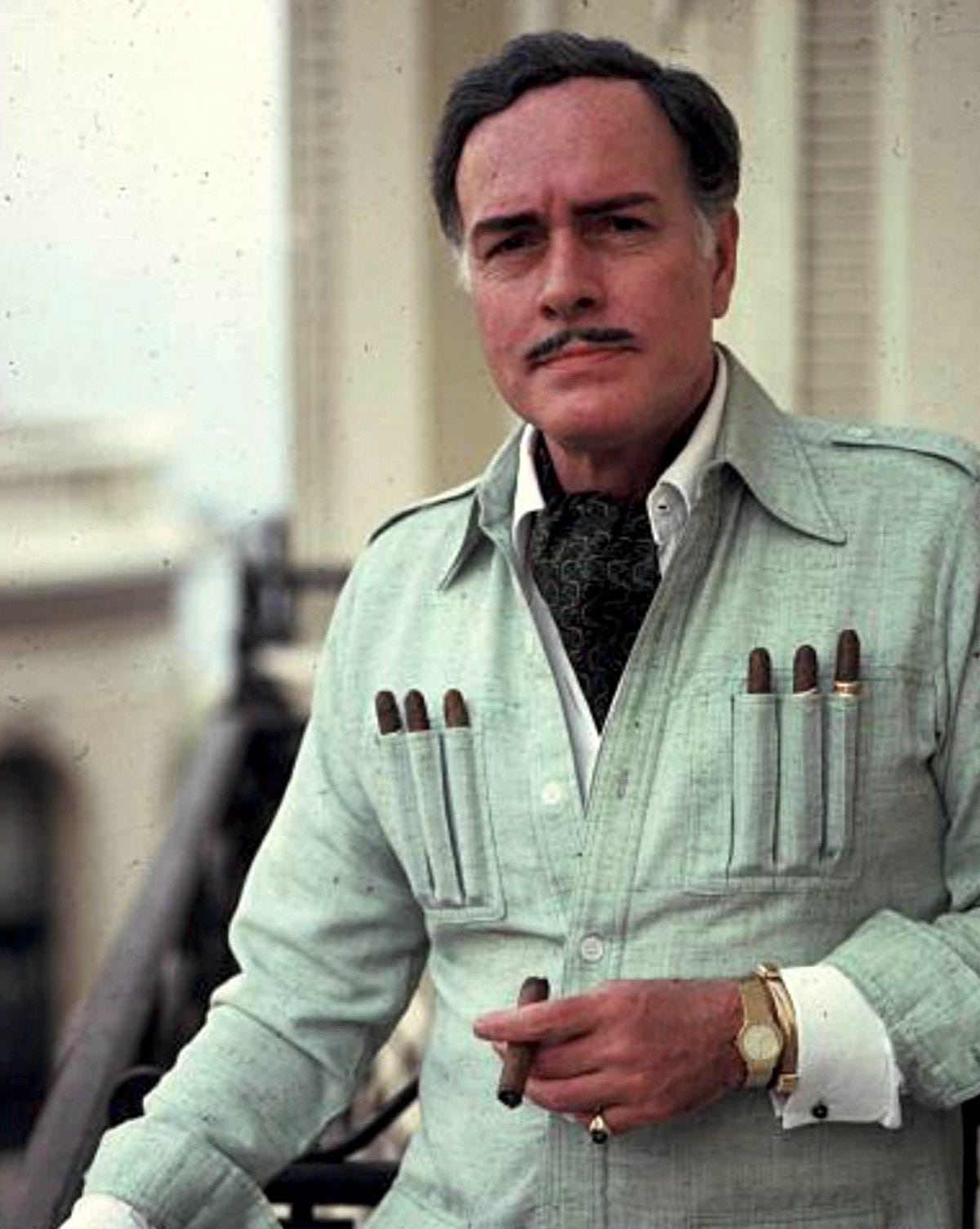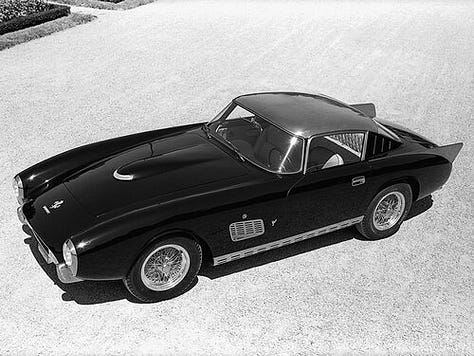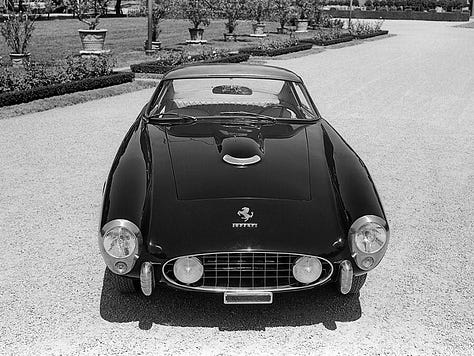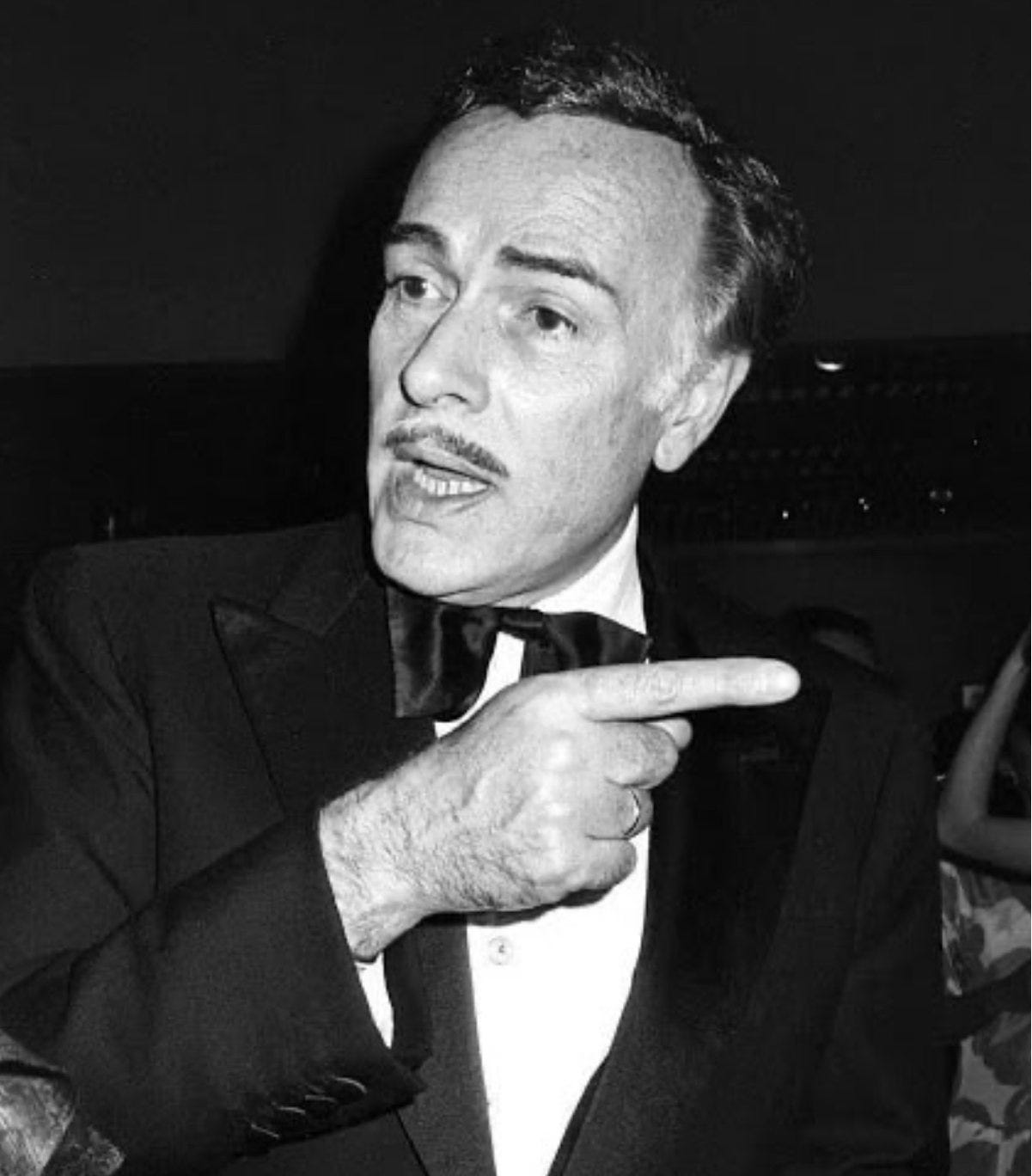Adorable Story #24: the Chronicle of Enrico di Portanova (Part 1)
How Texas oil turned a young man into a legendary bon-vivant
This is the first of a two-part, 4000-word long, Adorable Story: for the first time, we enter into “Long Form” territory here at
and to make the reading easier and more managable, subscribers will receive the second part of this Adorable Story next weekend.After 24 individual issues, I would also like to take this occasion to extend my personal gratitude to the Founding Member of
, Mr. Ralph C. for his extraordinary financial support to this Substack Newsletter.I would also like to thank all the monthly and yearly paid-subscribers for their ongoing (financial) support and all the almost 2000 free-subscribers for their continuous words of encouragement which are incredibly appreciated.
With warmest regards from Milan,
— Alberto @

Baron Enrico di Portanova, also known as Ricky to his friends, lived a life that could easily be mistaken for the plot of an extravagant Hollywood drama.
Early life
Even his date of birth is uncertain.
Ricky claimed to be born as Baron Roy Paul Apruzzo di Portanova in Los Angeles on August 16, 1933.
According to some sources though, Ricky had a penchant for subtracting some years to his age in the attempt to look younger, and he was actually born approximately a decade earlier and most likely on August 16, 1925-261.
He was the first son of the Italian playboy Paolo Apruzzo and the American heiress Lillie Cullen.
Many believed that Ricky was not a Baron from Naples, either. His father Paolo was even said to have declared:
“I am the only man who inherited a title from my son.”
Ricky’s maternal grandfather, Hugh Roy Cullen, was a 100% authentic American capitalist hero though: with just a fifth-grade education, by 1928 he became one of the richest men in the world.
He found oil for the first time near Houston in 1921. Relentlessly, he went on to make three more major finds in the following decade and the press called him the “King of the Wildcatters.”
Cullen’s biggest achievement was finding the mile-deep Tom O’Connor field in Refugio Country, Texas, on the Gulf of Mexico coastal plain: it was one of the biggest oil fields in Texas, worth at the time over 1 billion USD alone.
In 1932, Hugh Roy Cullen formed the Quintana Petroleum Company2 and took his only son and four daughters on a trip to Europe.
Lillie Cullen
Born in 1906, Lillie was the oldest of the four daughters of Hugh Roy Cullen: she was an American heiress who went to travel in Europe in 1932 with her family and fell in love with the handsome (albeit pennyless) Paolo Apruzzo, somewhere between Rome and Naples.
Paolo was an Italian playboy and would-be Hollywood actor in mute cinema, who later in life would call himself a baron: nobody could confirm any actual nobility of his family and no mention of any “Baron di Portanova” can be found in the heraldic registries in Italy.
After falling in love, Paolo and Lillie rushed to marriage in Los Angeles on December 16, 1932, and eight months later, on August 16, 1933, Lillie gave birth to Ricky, their first child: this caused a mortal embarrassment for the very conservative Cullen family.
While Hugh Roy Cullen did not disinherit his daughter, once Ricky was born, contacts between Lillie and the rest of the Cullen family stopped.
Thanks to her father’s genereous monthly allowance, Lillie and her husband initially lived an upper-class life in Los Angeles, where they raised their two sons: Ricky and Ugo.
Just a few years later, Lillie and Paolo divorced: she moved to New York City to live alone in a hotel room, and the sons ended up living in Italy with their father Paolo, who later re-married twice and completely lost contact with his ex-wife and the Cullen family.
Ricky, the older of the boys, grew up in Rome to become, like his father, a handsome man: in his younger years, Ricky travelled often to India, Burma and Ceylon in order buy and smuggle precious stones back to Italy to jumpstart a small jewellery business in Rome.
He showed clear signs of love for adventure and he did the best he could to enjoy the “Dolce Vita” of Rome at the time: he loved beautiful women and even claimed to have once pursued Ava Gardner from Rome to Berlin in a small Fiat and, once arrived in the German capital, had seduced her (not before having somehow put the living room of her flat on fire by accident).
Ugo, his younger brother, was mentally impaired due to schizophrenia and lived a secluded life near Sorrento (south of Naples): he would later become a poet and a painter.
In Houston, Lillie’s three younger sisters had all married average, middle-class men who would all end up working at Quintana Petroleum and eventually became pillars of Houston’s financial and philanthropic communities.
In 1936, Lillie’s only brother, Roy Gustav Cullen was killed on a drilling rig accident: this was a complete shock for Hugh Roy Cullen who began rethinking some of his life choices and started divesting part of his fortune to charities and other philantropic endeavors.
Over the next twenty years he gave away more than 200m USD to the University of Houston, the symphony, and various hospitals around Texas.
Legal Battle
The legal battle that Baron Enrico di Portanova was embroiled in was a remarkable saga that spanned over three decades.
It all started in 1957, once the patriarch Hugh Roy Cullen died, and the Cullen Trust was created in Houston to manage his estate.
At the time, Ricky was living in Rome under the name of Enrico Apruzzo. He was running a small precious stones trading business and a jewellery store in Via Margutta, where he designed and sold rings, brooches and necklaces.
He was far from being wealthy, but being a handsome young man fluent in both English and Italian, Ricky had married the Swedish model Ingrid Gustanson and, thanks to his wife, also subsidised his income by modelling for “fotoromanzi”: these were cartoon romances, illustrated by balloons of dialogue floating over still photographs, which were very popular in post-war Italy.
Sometimes in late 1957, having had no contacts with the American branch of his mother’s family for decades, Ricky found himself all of a sudden with a monthly cheque of 5k USD from the Cullen Trust (approximately 55k USD in today’s value).
He decided to keep his small flat in Rome but immediately relocated to Monte-Carlo for tax reasons and in order to start climbing the social ladder.
In January 1958, barely months after he started receiving the monthly cheque from Houston, Ricky bought from dr. Enrico Wax of the firm Wax & Vitale — a business man from Genoa and personal friend of Enzo Ferrari — a marvellous, custom-built, Ferrari Superamerica.
This was one of the only six ever built by the Maranello carmaker and the single one featuring lightweight aluminium bodywork personally hand-made by Sergio Scaglietti, the man responsible for the bodywork of Enzo Ferrari’s competition race-cars at the time (the other five had a more standard bodywork made by Pinin Farina).
So rare and desired was this car that the only other Ferrari Superamerica circulating in Rome at the time was owned by the legendary Prince Dado Ruspoli.



Ricky did not limit himself to enjoy the new (and substantial) monthly income he was regularly receiving from Houston, but decided to investigate the origin of his inheritance and to request the Cullen Trust for some clarifications and for a full picture of the accounting books of the Quintana Petroleum Company (the core asset of the Trust itself): all his requests went unanswered though.
A few months later, Ricky separated from his first wife, the Swedish model Ingrid Gustanson, and promptly married the Yugoslavian Ljuba Otasevic (the “j” is silent), who thus became the Baroness di Portanova.
Ricky and Ljuba started enjoying life across Europe and the Mediterranean while occasionally still chasing the Cullen Sisters for more information about the grandfather’s fortune, without much luck.
A few years passed when in 1963, following the advice of an American lawyer who suggested that something bigger was waiting for them in Texas, Ricky and Ljuba decided to relocate to Houston, with the aim of tackling the Cullen Sisters and getting a more transparent view of the family fortune.
Ljuba, Baroness di Portanova
Upon their arrival in Houston, the Baroness di Portanova made a striking impression on the city.
Ljuba was a tall, spectacular woman with thick black hair, dark eyes, and a wonderful figure: she spoke English with a mysterious foreign accent, wore clothes by Valentino and other European fashion designers, and carried off her appearances in public with great panache.
The Baroness had grown up in Yugoslavia, where her father was an officer in the Royal Air Force: the Nazis took him prisoner during WWII and put him in a concentration camp from 1941 to 1944.
After the war, Ljuba became a member of the Yougoslavian national women’s basketball team and in 1956 she was able to escape the Iron Courtain by using the passport she had been granted as an athlete.
She first escaped to some relatives in England and then moved to Italy, where she found work as an actress in the Italian movie industry: she was the body double of Sofia Loren in her risqué shots and even had a brief love affair with Cary Grant, who penned dozens of love letters to her in the late 50s.
While in Rome in 1960, Ljuba met Ricky and they promptly got married.
After they left the “Dolce Vita” in Rome and Europe for Houston in 1963, the Texan environment and social scene there seemed for Ricky and Ljuba something like Saudi Arabia, with swamp instead of desert.
To distract themselves, and thanks to the substantial monthly income regularly supplied by the Cullen Trust, the di Portanovas rented a prestigious flat in a high-rise building in River Oaks, one of the most sought after residential areas of Houston, and they moved there with a monkey.
Neighbouring tenants swore they even heard the Baroness playing basketball in her living room to pass time.
The Cullen Trust
Notwithstanding Ricky’s repeated requests for financial transparency on the assets and profits of Quintana Petroleum, the Cullen Sisters were not much forthcoming.
They maintained a firm grip on the family trust, and were reluctant to share detailed financial information with someone they considered not part of the Cullen family.
In 1965, in an apparent attempt to calm down the repeated requests for more information by Ricky, the Cullen Trust wired him a lump sum of 841,425 USD (8.5m USD in today’s money): the Cullen Sisters thought that with this large single disbursement, Ricky would simply go on with his life in Houston or elsewhere without further claims against them.
The payment had the exact opposite effect on Ricky, since he realized that his initial suspicions were correct and the money at stake was much larger than what the Cullen Sisters had made him initially believe.
Ricky admittedly faced two problems though:
His mother Lillie Cullen, who lived alone in a hotel room in New York City and started giving signs of increasing mental instability and frail health, had previously penned a will that left her share of the Cullen Trust only to her three sisters, with whom — after decades living apart — she was now completely estranged; and
His brother Ugo di Portanova had been diagnosed with paranoid schizophrenia and was incapable of defending his rights against the Cullen Trust.
It became imperative for Ricky to take legal action immediately in order to:
Change his mother’s will, so to remove her sisters and include him and Ugo as her beneficiaries instead;
Become a legal guardian of his brother Ugo di Portanova.
(Non) Compos Mentis
A legal battle between Ricky and the Cullen sisters in New York and Naples ensued.
At the same time, and critically, Ricky needed to have:
the Court of New York declare his mother Lillie “Compos Mentis” (of sound mind) so that she could change her will in Ricky’s favour; and
the Court of Naples to declare his brother Ugo “Non Compos Mentis” (of unsound mind), so that Ricky could become his legal guardian and double the amount received by the Cullen Trust as a share of their inheritance.
In August 1966, Ricky arranged a hearing at a bank in New York City to evaluate the sanity of Lillie (in 30 years she had grown immensely fat on a diet of Coca-Cola and sweet cream, so much so that the lawyers even struggled to find a suitable dress for her to wear at the hearing and look presentable). Three psychiatrists would attend the hearing —one for the Cullens, one for Ricky, and one independent—as well as attorneys for both sides.
The psychiatrists found her Compos Mentis (of sound mind): on the same day she changed her will in favor of her two sons and signed documents creating a Trust for each of them. Not long after the hearing, Lillie di Portanova entered a hospital in New York City, where she died on December 23, 1966. At the time of her death, her estate was valued at 4.8m USD (45m USD in today’s money) and it immediately became part of the Trust Funds of Ricky and Ugo.
In October of the same year, another hearing was held at the Villa Martha in Sorrento, Italy, to determine Ugo di Portanova’s mental condition.
Judge Pellegrino Senofonte from the Court of Naples, along with a clerk, arrived at the villa. A servant led the Judge to the bedroom of Ugo di Portanova: Ugo talked to the Judge about his recent confinements in psychiatric hospitals due to his schizophrenia outbursts. He explained the men that he was a painter and a poet, and at the time he was writing a book “with a philosophical content”: Hegel was in fact his favorite philosopher, and he declared the Bible a deeply immoral book because it represented a cruel and vindictive God.
Once the hearing was over, Judge Senofonte immediately declared Ugo “Non Compos Mentis.”
Ricky became his legal guardian on the same day and, on his behalf, promptly demanded the Cullen Trust that Ugo immediately be paid 841,425 USD (the same amount Ricky had received earlier in 1965).
The Cullen Trust complied immediately with this request.
Overnight, Ugo di Portanova became one of the richest mentally impaired men on the planet.
Shortly after this payment, Ricky sued the Cullen Sisters, claiming their breach of Texas probate code and demanding the two brothers rightful share of the company and of the profits it had made over the years.
(Continues to Part 2…)
— Alberto @
For the sake of clarity, in this two-part Adorable Story, we will assume that Ricky was born in 1933, as he claimed.
The Quintana Petroleum Company was named after a group of abandoned shacks that had been a flourishing port on the Brazos River when Houston was an inland village.







